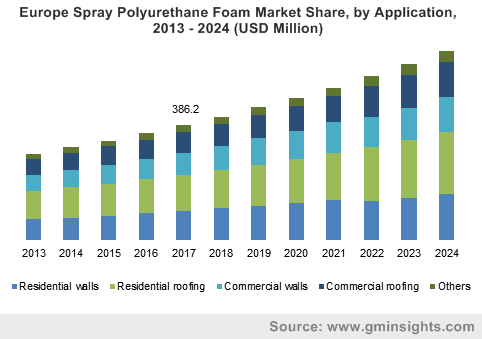North America Spray Polyurethane Foam Market to witness remarkable proceeds over 2017-2024, Residential walls to drive the application matrix
Publisher : Fractovia | Published Date : October 2017Request Sample
The relentless proliferation of construction activities in today’s urbanized world has left an unparalleled impact on spray polyurethane foam market size. This is evident from the incessant efforts undertaken by governments of developing nations toward the development of public infrastructure. Statistics depict that overall construction spending was more than USD 5 trillion in 2016, and experts forecast the figure to reach almost USD 8 trillion by 2024. SPF (Spray polyurethane foam) is basically a chemical composition extruded by two polymer based products i.e. isocynate and polyol resins. This unique blending scores them with a competitive advantage over other conventional insulation materials pertaining to efficiency, making its application spectrum across commercial and residential building sectors rather huge. Though still at a nascent stage, with increasing commercial popularity and global acceptance, spray polyurethane foam industry is likely to be one of the most rapidly evolving, opportunistic business spheres in the forthcoming years.
Europe Spray Polyurethane Foam Market Size, by Application, 2013 – 2024 (USD Million)

The progressive pathway carved by spray polyurethane foam market is quite vividly evident from the estimations that claim that the particular business space has garnered a revenue of USD 1.4 billion in 2016. As state and national building code jurisdictions are increasingly becoming more stringent with regards to energy competency, spray polyurethane foam market demand is expected to upscale. Manufacturers of the construction materials are actively investing in the commercialization of novel products that comply with these revised building code standards. While energy efficiency of a building can be obtained through incorporation of many systems, ranging from lighting fittings to flooring, experts believe, one of the most profound ways to improve the efficiency is through envelop insulation. Spray polyurethane foam market proliferation can be majorly grounded to this fundamental aspect.
Of late, energy crisis has become a global concern, a factor that has compelled end-use clients of SPF market such as residential and commercial builders to look for alternatives that are environmentally viable and energy efficient. In fact, estimates depict that spray polyurethane foam industry share from residential walls application accounted for a revenue of USD 350 million in the year 2016 and is likely to observe appreciable gains over 2017-2024. The growth can be attributed to increasing energy conservation demand worldwide along with several beneficiary factors of SPF insulation such as fire protection, termite control, moisture control and thermal protection.
Polyurethane spray foam insulation provides thermal insulation by avoiding any kind of air and soil pollutant inflow in the building structures, which by extension makes the infrastructure ecologically friendly and energy efficient. In this regard, it is prudent to mention that the United States Department of Energy considers inflow of air as one of the prime sources of energy loss in almost half of building infrastructures. With the influx of more stringent federal building codes encouraging high end energy competency, architects are increasingly inclining toward integrating all-in-one system in order to curb heat transfer in the building design. Thus, a strict regulatory framework speaks volume and has contributed significantly toward spray polyurethane foam industry share.
The reason behind North America becoming the hotspot for spray polyurethane foam market investors is quite overt- supportive government regulations and tax benefits with regards to energy efficient infrastructures. Procuring almost 40% of the overall spray polyurethane foam industry share, North America market acquired revenue of USD 650 million in 2016. Experts claim that with escalating demand for SPF from commercial and residential applications, North America will continue to witness a strong toehold in the global spray polyurethane foam industry.
Trailed by North America, APAC is another profound belt where SPF market demand is quite high. In APAC countries, high GDP growth has provided a significant impetus to construction activities especially across residential, industrial, and public infrastructure sector, the prime factor enhancing the regional spray polyurethane foam industry trends. Having held a sizable valuation of USD 400 million in 2016, APAC market is likely to witness a substantial y-o-y growth over 2017-2024, with India and China as the major revenue pockets.
As per industry experts, one major shift that spray polyurethane foam market is presently observing is consumer inclination toward low LGWP (Low Global Warming Potential) blowing agents. Honeywell, one of the leading names in the industry, has already established its platform in North America through its commercialization of LGWP products. Some of the other giants of SPF industry include, Bayer Material Science, BASF Corporation, Lapolla Industries, and The Dow Chemical Company.
Building fortification and resiliency has become the latest buzz in sustainable construction. In fact, designing in sync with sustainability goals nowadays has become a broad term that involves system integration - incorporating multiple functionality in a single platform. With ongoing product developments along with improving versatility of its application matrix, spray polyurethane foam market is forecast to surpass a valuation of USD 2.5 billion by 2024, with an estimated CGAR of 6.5% over 2017-2024.